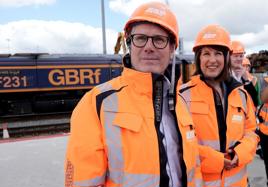All of the major parties across the UK have now released their manifestos with pledges varying between rail fare freezes, public ownership and the completion of Network North all making an appearance.
Labour and the Conservatives unveiled their respective plans, which in their own ways, promises reform for the industry. Away from Labour and the Conservatives, other parties have put pen to paper on their own plans for rail, including the Liberal Democrats, Green Party and both SNP and Plaid Cymru.
The manifestos were broadly welcomed by RIA, with its chief executive Darren Caplan commenting, “It is good to see rail featuring strongly within the political party election manifesto plans this week. This prominence reflects the importance of UK rail to delivering improvements in economic and productivity growth, which all parties say they are committed to delivering for the good of the country.”
The Conservatives main promises centered around “Network North”; the wide-ranging set of schemes put in place after the cancellation of HS2 Phase 2 last October. They are pledging to complete all the schemes mentioned in the original document including reinstating some lines that were victim of the Beeching cuts. This could mean the restoration of the Don Valley line between Sheffield and Stocksbridge, the Ivanhoe Line and Stoke-Leek lines would all still be reopened.
Although, in a rare display of specifics, the manifesto does pledge £5 million towards evaluating the possibility of extending the Borders railway from Tweedbank through to Carlisle.
There is a recommitment to invest £12 billion on Northern Powerhouse Rail, which remains extra to the £36 billion repurposed from the cancellation of HS2 and which formed the financial commitment in Network North. However, there was no mention of the extra £5 billion from the original £17 billion budget set out in 2021’s Integrated Rail Plan which Manchester Mayor Andy Burnham had said was pledged to the project at the end of May. RAIL has reached out to the Conservative party for clarification but has not had a response at the time of going to print. Other flagship schemes such as West Midlands Metro and the electrification of the North Wales main line (NWML) are also included. Although, despite warnings that the £1 billion originally pledged to complete the project was not sufficient, the manifesto has still attached the original cost estimate for it.
As well as Network North, fundamental reform is also a strong focus in the Conservative manifesto. The Conservatives will set up Great British Railways and ensure that the draft rail reform bill will be included in the first King’s speech. A promise which the Railway Industry Association (RIA) had asked for when the election was called in May.
As expected, the party has committed to completing HS2 from Birmingham to London Euston.
Labour launched its manifesto in Manchester and much like the Conservatives, it kept many of its pledges from when it launched its rail reform plan in April. However, there was little mention of rail in the 136-page document, with Labour distilling much of its manifesto plans for rail into ensuring that passenger rail returns to public ownership as soon as franchise contracts end. Labour is planning on establishing Great British Railways which it envisions having responsibility for day-to-day operations.
However, unlike the Conservatives, Labour does not put a cost to Northern Powerhouse Rail, with the manifesto merely pledging to “improve connectivity across the cities in the north of England.”
Digital ticketing and ticketing reform were a key focus in April’s rail plan, but it is curiously missing from the manifesto will little to no mention of Labour’s plan on how it will implement the change.
Labour intends on giving more power to devolved regions in England, to allow them to design their own services and has also pledged to keep open access available on the network.
The Liberal Democrats key manifesto pledge centered around rail fares and the promise of freezing them. It will also extend electrification across the country’s rail network as well as deliver Northern Powerhouse Rail. Much like the Labour Party though, it doesn’t specify where and there is very little on how it would be delivered other than producing a 10-year electrification strategy.
Labour don’t mention HS2 at all in its manifesto with the Liberal Democrats the only party to promise to review the decision to cancel the northern leg.
The Green Party’s manifesto promises a publicly owned railway and goes one further than Labour in its plan for public ownership as it is also pledging to replace aging rolling stock owned by rolling stock companies.
In Wales, Plaid Cymru has pledged to make sure rail infrastructure becomes devolved to Wales, to bring it in line with Scotland and Northern Ireland. It has also demanded that £4 billion it claims it is entitled to from the cancellation of HS2 is provided to be spent on infrastructure projects.
At the time of going to press, the Scottish National Party had not released its manifesto.
Whilst some details for rail freight growth form part of manifestos for both major parties, there is little detail. The Conservatives maintain they will support growth in the sector but the pledge to grow it by 75% by 2040 which it announced in December 2023 was not mentioned whilst Labour are promising a “duty” to promote the use of rail freight.
Head to RAIL's election coverage area for more opinion and news on the parties' plans for rail.
















Login to comment
Comments
No comments have been made yet.